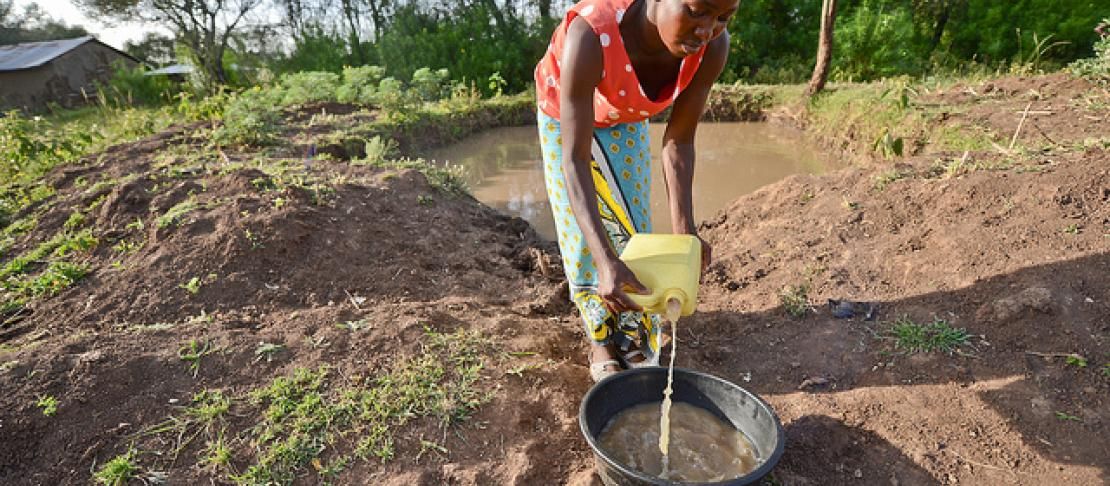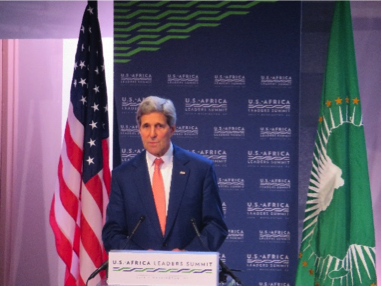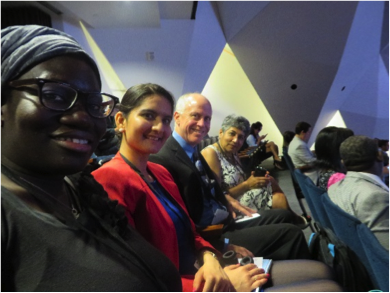US and African leaders home in on food security in a changing climate

The recent US-Africa Leaders’ Summit was the background for a high-level session on “Resilience and Food Security in a Changing Climate” at the National Academy of Sciences in Washington, D.C.
The session convened top US and African leaders to discuss challenges in building climate change resilience and ensuring food security – and craft innovative solutions going forward. Representatives from the CGIAR Research Program on Climate Change, Agriculture and Food Security (CCAFS) were invited to attend the session.
You can’t build a peaceful world on empty stomachs and human misery”
– John Kerry, US Secretary of State
The session was well attended by high-level officials from both sides of the Atlantic. US Secretary of State, John Kerry, opened the event with remarks on ensuring that farmers are enabled to face the challenges of climate change. This was followed by panel discussions on “Commitment and Context” and “The Power of Partnerships”.

uS secretary of state john kerry addresses the "Resilience and food security in a changing climate session" at the US-Africa Leaders' summit. photo: j. Hansen (CCAFS)
The Prime Minister of Ethiopia then took the floor, noting that Africa’s agricultural share in GDP has gone down to 4% in some countries. He argued that Climate Smart Agriculture (CSA) should be the basis of future programs in Africa.
When asked what the main challenges of Africa’s agricultural development in the face of a changing climate are, and the role of women in empowering such development, Madam Zuma, Chairperson of the African Union Commission, responded with a story. When she arrived in Malabo, where the Africa Agriculture Declaration was held in June 2014, she spoke with local women farmers. They told her that they wanted the harrowing image of the African woman with a baby on her back and a handheld hoe to be an image of the past. They wanted that handheld hoe to be a relic of museums. In addition, they demanded three things: access to modern implements to improve productivity, access to more land, and access to capital and finance.
If African women were paid for their hard work in agriculture, they would be billionaires by now.
– Madam Zuma, Chairperson, African Union Commission
Feeding the world under a 4 degree future
The solutions promoted by Madam Zuma include reaching all farmers, not just subsistence farmers; attracting youth into agriculture; investing in most precious resource ("our people"); and taking the lead on Climate Smart Agriculture
Feed the Future, President Obama’s signature initiative to ensure food security by increasing private investments in the agricultural sector across the globe, was heralded during the event as a key opportunity for the existing research players working on climate smart agriculture for smallholder farmers in developing countries.
For every three dollars spent on development, a dollar is lost in disasters.”
– Judith Rodin, President, The Rockefeller Foundation

ccafs representatives at the "resilience and food security in a changing climate" session at the US-Africa Leaders' summit.
Other key US government initiatives on agriculture and climate change announced during the summit include:
1. The Global Alliance for Climate Smart Agriculture (CSA): The US announced publicly for the first time its commitment to endorse the CSA Alliance, to be launched formally during the September UN Climate Summit, and entrain other countries to do same. The CSA Alliance is a multi-partner movement to scale out CSA action on the ground, with the triple aims of: (a) improved food security, (b) higher climate resilience particularly among poor farmers, and (c) reductions in emissions associated with agriculture. During 2014 the UN Food and Agriculture organization and CCAFS are co-convening a process to define the knowledge agenda of the CSA Alliance.
2. Global Resilience Partnership - USAID-Rockefeller Foundation: $100 million investment in building 100 social and climate resilient cities across the world.
3. New Alliance for Food Security and Nutrition: $10 billion in socially responsible private commitments, 3 million farmers reached through training, services and production contracts
4. World Bank’s Agricultural Insurance Development Program: $1 million investment in providing analysis and technical assistance to countries in designing and implementing sustainable, cost-effective public private partnerships in agricultural insurance.
These initiatives rely heavily on building worldwide partnerships to work on building the resilience of African agriculture to climate variability and change. They most of all open new opportunities for CGIAR scientists to engage in developing innovative solutions to enhance the resilience of African agriculture, informing the design of new climate smart investments and strategies in Africa.
CCAFS will continue to play the role of a broker, linking cutting-edge CGIAR science with development partner investments on climate change in Africa, towards building more-resilient agricultural futures on the continent.
Harneet Kaur is an intern with the CCAFS Research Theme on Climate Risk Management, located at the International Food Policy Research Institute.
Arame Tall is a climate services scientist with the CCAFS Research Theme on Climate Risk Management, located at the International Food Policy Research Institute.
James Hansen is leader of the CCAFS Research Theme on Climate Risk Management, located at the International Research Institute for Climate and Society.



